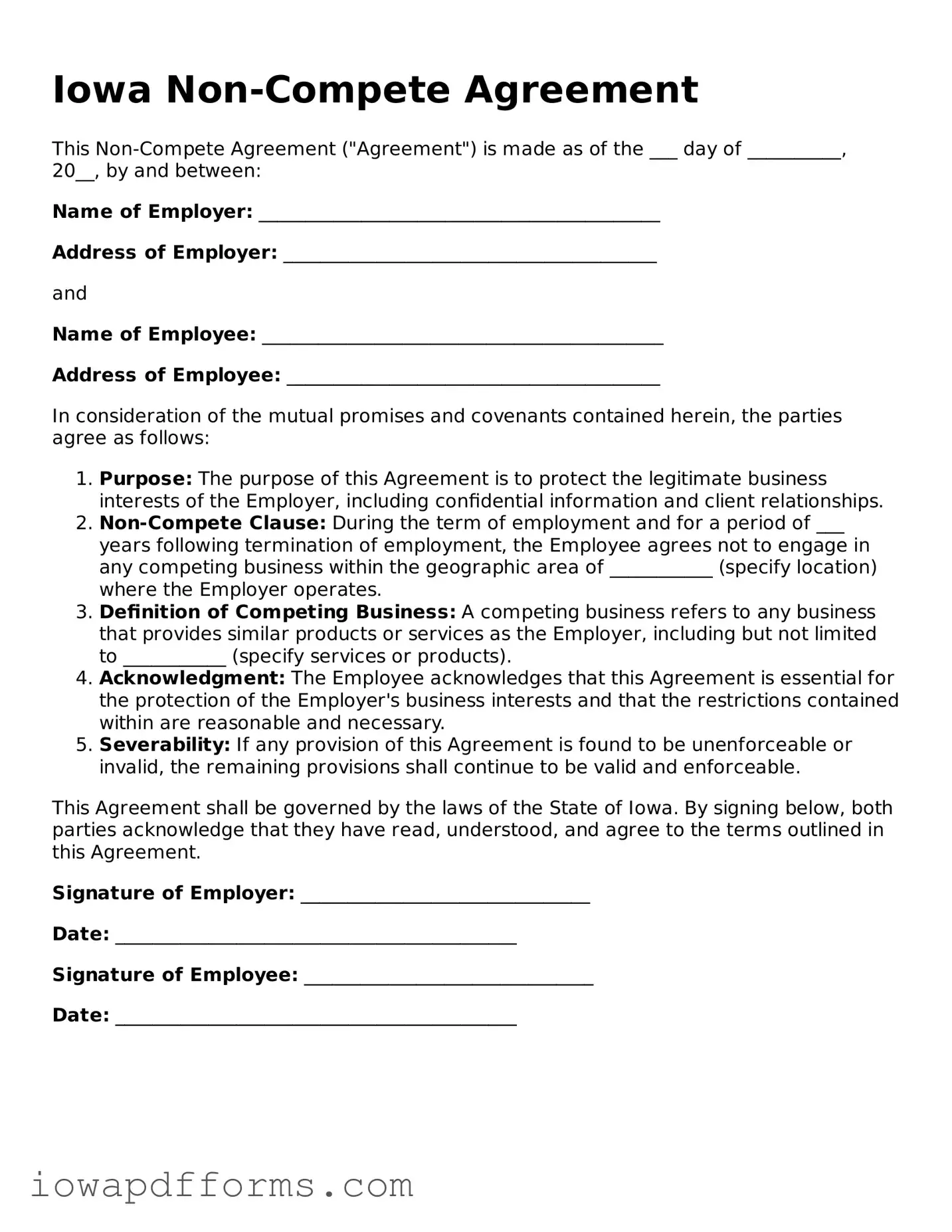The Iowa Non-compete Agreement is similar to an Employment Agreement, which outlines the terms of employment between an employer and an employee. Both documents serve to protect the interests of the employer while establishing the expectations and responsibilities of the employee. While the Employment Agreement may cover salary, job duties, and benefits, the Non-compete Agreement specifically focuses on limiting the employee's ability to work for competitors after leaving the company.
Another document akin to the Non-compete Agreement is the Confidentiality Agreement, also known as a Non-disclosure Agreement (NDA). This document is designed to protect sensitive information shared between parties. Like the Non-compete Agreement, the Confidentiality Agreement restricts certain actions, but it primarily focuses on preventing the unauthorized sharing of proprietary information rather than limiting employment opportunities.
A Proprietary Information Agreement shares similarities with the Non-compete Agreement in that both aim to safeguard a company's intellectual property. This document requires employees to acknowledge the ownership of proprietary information and agree not to disclose it. While the Non-compete Agreement restricts future employment, the Proprietary Information Agreement emphasizes the protection of confidential business knowledge.
The Independent Contractor Agreement is another related document. This agreement outlines the terms under which a contractor will provide services to a client. While it may include non-compete clauses similar to those found in a Non-compete Agreement, its primary purpose is to define the working relationship and payment terms between the contractor and the client.
A Partnership Agreement can also be compared to the Non-compete Agreement. This document governs the relationship between partners in a business venture. It may include non-compete provisions to protect the business from partners who might start competing businesses after leaving. Both agreements focus on protecting the interests of the business, albeit in different contexts.
The Non-solicitation Agreement is closely related to the Non-compete Agreement. This document restricts an employee from soliciting clients or employees from their former employer for a specified period after leaving the company. While the Non-compete Agreement prevents working for competitors, the Non-solicitation Agreement focuses on maintaining business relationships and employee retention.
For those involved in the sale or purchase of a trailer, completing a Trailer Bill of Sale form is essential to ensure a clear transfer of ownership and avoid legal issues. This form acts as a safeguard for both parties, detailing the agreements made and providing necessary proof of the transaction. To learn more about this important documentation, visit billofsaleforvehicles.com/editable-trailer-bill-of-sale for further details.
Another similar document is the Severance Agreement. This agreement may include a Non-compete clause as part of the terms for receiving severance pay. Both documents aim to protect the employer's interests after an employee's departure, but the Severance Agreement also addresses compensation and benefits that the employee will receive upon leaving the company.
The Release of Claims document can be compared to the Non-compete Agreement in that both require an employee to waive certain rights upon leaving a company. The Release of Claims typically involves the employee agreeing not to pursue legal action against the employer in exchange for a settlement or severance. While the Non-compete Agreement focuses on future employment, the Release of Claims addresses potential legal disputes.
A Shareholder Agreement may also bear similarities to the Non-compete Agreement, particularly in companies with multiple owners. This document outlines the rights and obligations of shareholders, including potential restrictions on competition. Both agreements aim to protect the business's interests and ensure that shareholders do not undermine the company's operations.
Finally, the Licensing Agreement can be viewed as similar to the Non-compete Agreement. This document allows one party to use another's intellectual property under specified conditions. While it does not directly limit employment opportunities, it establishes the terms under which proprietary information can be utilized, thereby protecting the interests of the party granting the license.

